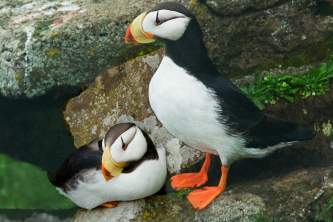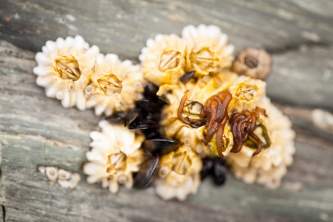Denali Zero-Landfill Project
More than 2.7 million visitors explore Alaska each year and they leave behind more than footprints.
Alaska is remote and recycling services are limited. Together, we can keep Alaska wild so future generations can experience the natural beauty we enjoy today. Follow these sustainable travel tips from the Denali Zero-Landfill Project to help minimize waste:
- Bring a reusable bag to carry your souvenirs and supplies.
- Bring or buy a reusable water bottle and coffee mug to refill.
- Choose groceries with minimal packaging and recycle as you pack.
- Opt for paperless tickets and receipts.
- Where recycle bins are available, please recycle properly. If you pack it in, please pack it out.
- Post photos on social media of how you reduce, reuse, and recycle while you travel. Tag #DontFeedTheLandfills.
What is the Denali Zero-Landfill Project?

Visitors to Denali National Park and Preserve – and tourism destinations worldwide - leave behind an enormous amount of trash, creating a big challenge for park managers and gateway communities
The national park zero-landfill initiative was created ten years ago to reduce waste, invest in sustainable solutions, and educate visitors about easy ways to minimize their impact on the environment. Initially, help and inspiration came from partners like Subaru of America, the only zero-waste automotive manufacturing facility in the United States. By sharing its expertise with national parks and providing innovation grants, Subaru is helping the National Park Service prepare for its second century of serving visitors and protecting America’s most treasured places.
The Denali partnership grew to include community and business members who are all making efforts to minimize waste. Thanks to the additional support of the National Parks Conservation Association, Doyon/Aramark Joint Venture, Denali Education Center, park stakeholders, local youth, and Denali community partners, we’re being responsible stewards because who we are is what we leave behind.
How is the initiative making a difference?
Good news: it’s working! Thanks to the efforts of the Denali Zero-Landfill Project, annually since 2018 at least 30% of the waste collected in the park's local landfill was diverted away from the Denali Borough Landfill and instead was recycled or composted.
It grew beyond the park boundaries to inspire collaborations between the gateway communities of Denali and Talkeetna, and throughout the Alaska Travel Industry. Innovative ideas are being tried and shared among businesses. Holland America – Princess Alaska, a land based tourism company with operations in Denali and near Talkeetna have made numerous changes since becoming a part of the ZLI movement. They have eliminated unnecessary packaging in box lunches, no longer offer single-use condiment packages or straws, removed plastic liners in guest room trash cans, installed food bio-digesters that reduce food waste to grey water, made agreements with retailers to take back product packaging waste, and made investments in balers, glass crushers, and trash compactors.
Who we are is what we leave behind. Choose to reuse, reduce, and recycle to keep Alaska wild!




